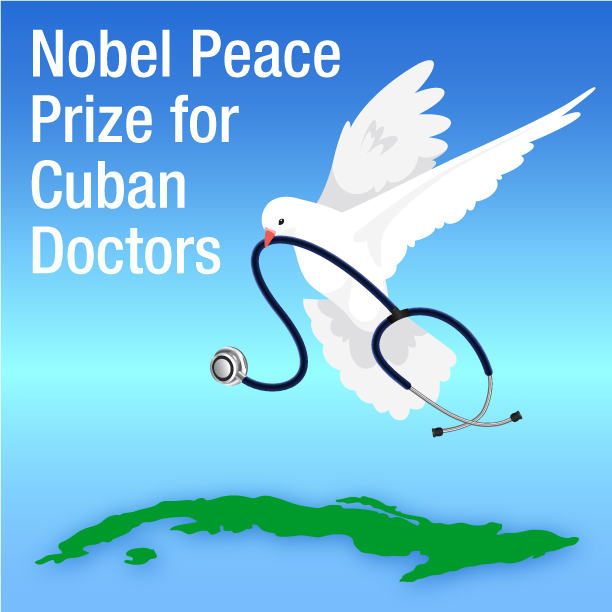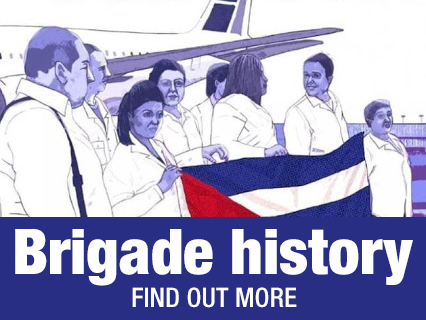Why does Cuba’s Henry Reeve Brigade deserve the Nobel Peace Prize?

Henry Reeve Brigade medics arrive to help fight coronavirus, 2020
Since March 2020, more than 3,700 Cuban doctors, nurses and technicians have volunteered alongside health workers in 39 countries to fight the COVID-19 pandemic. They are members of Cuba’s Henry Reeve International Medical Brigade which has saved more than 93,000 lives worldwide since its formation in 2005.
For their selfless humanitarian work saving lives and promoting friendship and cooperation between nations the Cuban health workers who make up the Henry Reeve Brigade deserve the Nobel Peace Prize.

HEALTH – PEACE – HUMANITARIANISM – SOLIDARITY
Key principles of the Henry Reeve Brigade
The Henry Reeve Brigade was established on 19 September 2005 in response to the damage and devastation caused by Hurricane Katrina to New Orleans in the United States. It was named Henry Reeve in tribute to a young US citizen who had joined Cubans fighting for independence from Spain in 1868 and who has since become an enduring symbol of international solidarity in Cuba.
The mission of the Brigade is to provide medical assistance to populations in countries hit by natural disasters and epidemics, and to contribute to their long term recovery. The founding principals are of:
- health as a human right
- the right to peace and life
- humanism – affirming dignity, equality and social justice
- solidarity – collaboration and respect between peoples regardless of politics or religion

A Cuban medic arriving in Sierra Leone during the Ebola outbreak in 2010
COVID-19 RESPONSE 2020
In the last six months Cuban medical volunteers have gone to 39 countries, including Angola, Jamaica, Peru and Italy, treating more than 360,000 people and saving over 10,000 lives. More than 3,700 Cuban healthcare professionals have taken part in these missions; 61.2 % of them are women.

‘Gracias Cuba’ projected onto the side of the Mole Antonelliana building in Turin as a thank you from the city to the Cuban medical brigades for their help fighting COVID-19
“They are lifesavers. In some Caribbean countries, they constitute the backbone of the response to the pandemic.”
Ralph Gonsalves, prime minister of Saint Vincent and the Grenadines, and chairman of the Caribbean bloc CARICOM
“Without them, it [COVID-19] would have been very much harder for us.”
Patricia Ingram-Martin, Chief Nursing Officer, Jamaica
“They were the first to accept our request for help and the last to return home. Thank you.”
Attilio Fontana, president of Lombardy region, Italy
“We were shipwrecked and you succored us without asking us our name or origin. After months of mourning, anguish and doubts, now we see the light.”
Stefania Bonaldi, mayor of Crema, Lombady, Italy
INTERNATIONAL RECOGNITION
In May 2017 the World Health Organization awarded the Dr LEE Jong-wook Memorial Prize for Public Health to Brigade. Yohan Ihn, President of the Korea Foundation for International Healthcare, said that “the Henry Reeve Brigade has disseminated a message of hope to the whole world” .

SAVING LIVES
More than 13,500 Cuban healthcare professionals have participated in 71 brigades and 53 missions since 2005. They have delivered medical care to approximately 4 million people and have saved the lives of more than 93,000 in 45 nations and 5 non-self-governing territories following natural disasters from earthquakes to floods and during cholera and Ebola outbreaks.

Cuban doctors in protective clothing during the Ebola outbreak in West Africa
West Africa Ebola epidemic, 2014
In response to an appeal by the World Health Organization 5,000 Cuban doctors and nurses volunteered to assist in combating the Ebola epidemic. Of these, more than 500 were chosen for training and 256 finally selected to participate in the fight against Ebola. Cuban medics treated more than 2,000 patients in Sierra Leone, Liberia and Guinea Conakry.

A Cuban doctor working in a field hospital in Kashmir, 2005
Pakistan earthquake, 2005
More than 2,500 healthcare workers over period of 8 months treated 1.7 million patients (73% of earthquake victims), performed 14,000 surgeries, provided 166,000 specialised rehabilitation services and saved more than 2,000 lives. The Brigade left 32 field hospitals and Cuba gave 1,000 scholarships to Pakistani students.

Haiti cholera outbreak, 2010
As well as responding to the 2010 earthquake in Haiti, Cuba also gave support in the battle against a cholera epidemic, lending medical assistance to more than 400,000 people and saving the lives of approximately 76,000 patients.
60 YEARS OF INSPIRATIONAL INTERNATIONALISM
Cuba’s humanitarian response to emergencies dates back to May 1960 when the island sent a medical team to help the Chilean people after the country was struck by an earthquake. Between then and the foundation of the Henry Reeve Brigade in 2005, a further 30 Cuban medical missions responded to emergencies in 19 countries. This is in addition to longer term international medical missions which have helped deliver preventative and curative care to a total of 1,931 million people around the world and save 8.2 million lives between 1960-2019. Notable examples include:

Latin American School of Medicine (ELAM)
The Latin American Medical School was established in 1998, originally to provide training to young people from Central and South American countries struck by natural disasters who would then return home and work in the poor communities from which they came. Since then its remit has grown. To date ELAM has trained 29,749 doctors from 123 nations from every region of the world, including students from marginalised communities in the United States. In the current academic year (2019-2020) the school is training 1,358 students from 87 countries.

Operation Miracle
This sight-saving programme came into being in 2004, after Cubans running adult literacy programmes in Venezuela discovered that many students were unable to see properly due to cataracts. In response, hospitals and clinics were set up to provide treatments ranging from cataracts and glaucoma to corneal transplants.
In the last 16 years more than 4 million people have received sight-saving operations in Latin America, the Caribbean and Africa as part of the Operation Miracle programme.

Chernobyl children
Following the nuclear accident in the Ukraine in 1986, Cuba converted a former beach resort on the outskirts of Havana into a treatment centre for victims. From 1990 – 2011 more than 25,000 patients, the majority of whom were children, were treated for the effects of radiation poisoning. Cuba recently announced that it will resume the programme for the sons and daughters of these children who are now showing ailments similar to those of their parents.
AWARD THE NOBEL PEACE PRIZE TO CUBA’S HENRY REEVE BRIGADE
To support the campaign to award the Nobel Peace Prize to Cuban doctors please sign the petition here
If you are a member of parliament, or a university professor or chancellor, you can also make a nomination directly to the Nobel Prize Committee yourself. Please contact communications@cuba-solidarity.org.uk for information on how to nominate the brigade.







